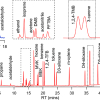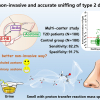
Discontinuous atmospheric pressure interface (DAPI), consisting of a pinch valve, a silicone tube and two metal capillaries, is a common inlet for miniature ion trap mass spectrometers (ITMS). It can improve the transport efficiency while help the miniaturisation of the mass spectrometers. DAPI-ITMS is widely used for drug detection, metabolomics analysis and environmental applications.
Recently, a research group led by Professor LI Haiyang from the Dalian Institute of Chemical Physics (DICP) of the Chinese Academy of Sciences (CAS) discovered a new ionisation phenomenon known as triboionisation inside the silicone tube of the DAPI. In the phenomenon, analytes could still be detected with no extra ionisation source in a DAPI-ITMS. The researchers confirmed that the friction on the inner surface of silicone tube could induce ionisation during the opening of the DAPI. They improved the ionisation efficiency of DAPI-ITMS by changing the material and roughness of the inner surface of the silicone tube in the DAPI. Moreover, they found that by increasing the number and the frequency during the on/off of the pinch valve of the DAPI, the signal intensity of ITMS could be improved by nearly 20 times.
“We have applied this triboionisation to detect the ketones on the inner wall of silicone tube after continuous enrichment”, said Prof. LI. “This work proposed an ionisation source which needs no light, heat, radiation or electric supply.”










